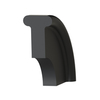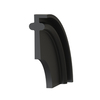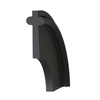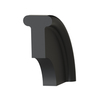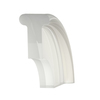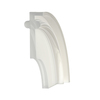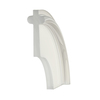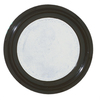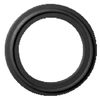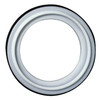-
-
ERIKS Tri-clamp Orifice Plate
-
ERIKS Tri-clamp Seal Envelop
Tri-clamp gaskets
Tri-clamp gaskets are used as seals in tri-clamp couplings. Due to the special design, matched specifically to the corresponding tri-clamp coupling, they completely fill the dead space. As a result, tri-clamp gaskets are widely used in the pharmaceutical and food industries.
When purchasing a tri-clamp gasket, you must pay close attention to the dimensions, the correct coupling standard and the desired (rubber) compound. You should also consider the certificates required for your application. Most materials comply with the USP pharmaceutical regulations and the FDA and EC1935 regulations for food.
Tri-clamp gasket dimensions
The size of a tri-clamp gasket depends on the dimensions of the flange in your application. Once you know what the inner diameter and outer diameter of this flange are, you can easily determine the applicable standard. Make sure that you use the flange dimensions for this, not those of the gasket itself. There is some overlap between the different standards, but they are not identical. In addition, the inner diameter of a seal is often very slightly larger than the inner diameter of the coupling, so that when assembled and compressed, the seal exactly matches the flange.
The dimensions of our tri-clamp gaskets all comply with international standards. Those standards are: ASME-BPE 2009, BS4825, DIN 32676, ISO2859, ISO1127, Imperial Standard and SMS3017.
Tri-clamp gasket materials
Our tri-clamp gaskets are made from a range of materials. The most common are EPDM and VMQ (silicone), but FKM (Viton), NBR, and various PTFE types are also available. Each material is the basis for a unique compound; i.e. a recipe of different material components that result in specific properties when combined.
It is important to ensure that the material used for your tri-clamp gasket is suitable for the conditions under which it will be used. So you should always consider the temperature, the pressure, the medium and the duration . It is very important that you also take into account CIP (Clean in Place) and the products you use in order to avoid problems associated with chemical resistance. SIP (Steam in Place) is also a factor to consider in some cases. The summary below provides concise information about the most popular materials and their properties.
- EPDM tri-clamp gaskets - One of the most commonly used materials for tri-clamp couplings is EPDM. This material is highly suitable for various acids, bases, solvents, hot water, steam (SIP) and CIP processes that use NaOH and other chemicals. All EPDM tri-clamp gaskets withstand low temperatures (down to -50°C) and are resistant to UV radiation and ageing. Some products, such as Compound 559273, are also suitable for higher temperatures (up to +150°C).
- VMQ tri-clamp gaskets - VMQ is also one of the most commonly used materials for tri-clamp gaskets. VMQ is widely known as silicone and is very flexible. A transparent material, for example Compound 714703, is often used for this type of gasket. VMQ tri-clamp gaskets are resistant to both low (-60°C) and high (+200°C) temperatures. They also do not degrade when exposed to SIP and CIP cleaning processes.
- NBR tri-clamp gaskets - NBR, or nitrile, is another material that is often used in the production of tri-clamp gaskets. NBR is an ideal material for sealing applications involving specific oils. However, it is not very resistant to UV radiation, ageing and high temperatures (above +120°C).
- FKM tri-clamp gaskets - Applications involving strong chemicals and high temperatures require the use of an FKM tri-clamp gasket. This material is best known by its brand name, Viton. It can withstand temperatures as high as +200°C. Furthermore, the standard compounds are resistant to many strong acids and bases, but not always to hot water or steam. Only a few special FKM compounds are suitable for applications that involve unusually low temperatures (-40°C or lower).
- PTFE tri-clamp gaskets - PTFE, also known by the brand name Teflon, is resistant to strong acids and bases, low temperatures (down to -200°C) and high temperatures (up to +250°C). In addition to the pure PTFE tri-clamp gaskets, ERIKS offers PTFE envelope gaskets (loose or fixed, combined with a rubber core) and the filled PTFE types, such as Gylon. PTFE materials are not elastic, meaning that they require a higher sealing force compared to rubber.
Would you like more information about the chemical resistance of our materials? Refer to our Chemical Resistance Guide for a handy overview.
Ordering tri-clamp gaskets at ERIKS
How do I select the right material for my tri-clamp coupling gasket?
To choose a suitable material for your tri-clamp gasket, you need to consider the temperature and medium in the application first. The associated approvals, such as USP, EC1935/2004 and FDA, are a further important consideration.
What prices does ERIKS charge for the tri-clamp gaskets?
The price of our tri-clamp gaskets is shown on the product pages. If the price is not immediately visible, it will be displayed after you have logged in.
What delivery times does ERIKS offer for tri-clamp gaskets?
The delivery time for a specific tri-clamp gasket is shown on the relevant product page. If you require a product more quickly, choose a different material that also works in your application.
If you need help finding a good alternative, please contact us via the enquiry form .
Can I order custom tri-clamp gaskets?
Are you looking for a tri-clamp gasket of a different size, shape, colour or material? Or do you need a gasket for a special application, or one that meets specific certification requirements? Let us help - contact us via the enquiry form .
